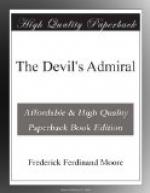There were papers at the bank which I must take with me, and on the way to the docks I stopped there. As I went in there was a sallow-faced man standing outside a grated window talking with a teller. He was smoking a long Russian cigarette, and pulling with nervous fingers at a tiny black moustache. His malacca cane was leaning against the wall by his side. I recognized him as the man who had driven the Rev. Luther Meeker out of the rear room of the bank, when the latter went in to seek alms, as he said.
He stood aside as I approached the teller’s window, and the clerk handed out the papers to me, with a smile and some trifling remark.
“When are you leaving, Mr. Trenholm?” asked the clerk.
“In an hour in the Kut Sang,” I said, and the man with the cigarette turned round and surveyed me with mild surprise. As I stepped to the door he went up to the window and whispered something to the clerk.
“Mr. Trenholm! Just one minute, please, Mr. Trenholm!”
The clerk called me and I halted, thinking that he had forgotten something about my letter of credit, or wanted my signature again.
“I want you to meet Mr. Trego,” said the teller. “He will be with you in the Kut Sang.”
I bowed, and Mr. Trego bowed, but his eyes were appraising me as he looked at me, although outwardly he had the excessive politeness of a Latin.
“I am very glad to meet you,” he said without the trace of an accent, although in that mechanical manner which makes the words sound as if they had been read many times out of a grammar or phrase-book. I took him for a Frenchman.
“I must be going now, but I hope to meet you on board,” I said, and we bowed again and I left him.
“He’s all right,” I heard the teller say as I went out, and understood that the bank-clerk had assured Trego that my character was good enough for him to be friendly with me on the passage to Hong-Kong.
As we swung out of Calle San Fernando I saw the Kut Sang tied up at the embankment of the Pasig River, with the Blue Peter at her foremast and heavy black smoke pouring from her funnel. She had the aspect of a vessel getting ready for sea, and the last of her cargo was being put into her hold.
It was then that I was attracted to a knot of natives and sailors clustered about an organ, in front of the decrepit building which I knew for the Sailors’ Home, roaring out the chorus of “Rock of Ages” as though it were a chantey. There could be no mistaking the figure seated at the wheezy little organ—the Rev. Luther Meeker, with his battered helmet on the back of his head and his goggles turned skyward as he wailed in a high-piped tenor the words of the old hymn.
He was too busy to see me and was making hard going of the tune, for the assorted voices which followed his lead held to various keys. He may have seen me from behind his goggles, but, if he did, he gave no sign, and I urged the driver to whip up the horse and pass the group at a good clip. I had no desire to be annoyed by the old impostor, and was afraid that he might have some new pretext to keep me from going in the Kut Sang.




